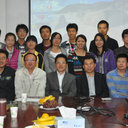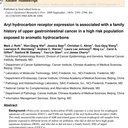Bioactive Components from Qingwen Baidu Decoction against LPS-Induced Acute Lung Injury in Rats.
Kulcsszavak
Absztrakt
Qingwen Baidu Decoction (QBD) is an extraordinarily "cold" formula. It was traditionally used to cure epidemic hemorrhagic fever, intestinal typhoid fever, influenza, sepsis and so on. The purpose of this study was to discover relationships between the change of the constituents in different extracts of QBD and the pharmacological effect in a rat model of acute lung injury (ALI) induced by lipopolysaccharide (LPS). The study aimed to discover the changes in constituents of different QBD extracts and the pharmacological effects on acute lung injury (ALI) induced by LPS. The results demonstrated that high dose and middle dose of QBD had significantly potent anti-inflammatory effects and reduced pulmonary edema caused by ALI in rats (p < 0.05). To explore the underlying constituents of QBD, we assessed its influence of six different QBD extracts on ALI and analyzed the different constituents in the corresponding HPLC chromatograms by a Principal Component Analysis (PCA) method. The results showed that the pharmacological effect of QBD was related to the polarity of its extracts, and the medium polarity extracts E2 and E5 in particular displayed much better protective effects against ALI than other groups. Moreover, HPLC-DAD-ESI-MSn and PCA analysis showed that verbascoside and angoroside C played a key role in reducing pulmonary edema. In addition, the current study revealed that ethyl gallate, pentagalloylglucose, galloyl paeoniflorin, mudanpioside C and harpagoside can treat ALI mainly by reducing the total cells and infiltration of activated polymorphonuclear leukocytes (PMNs).





